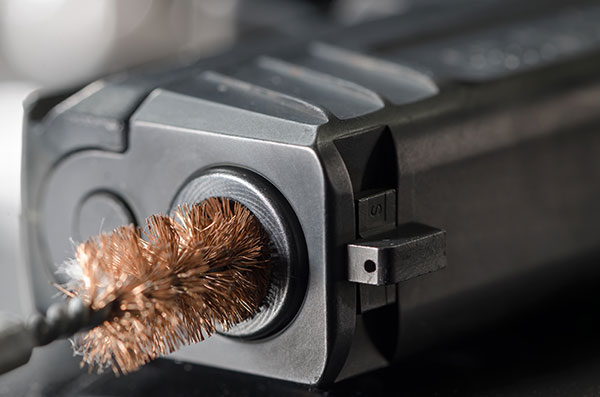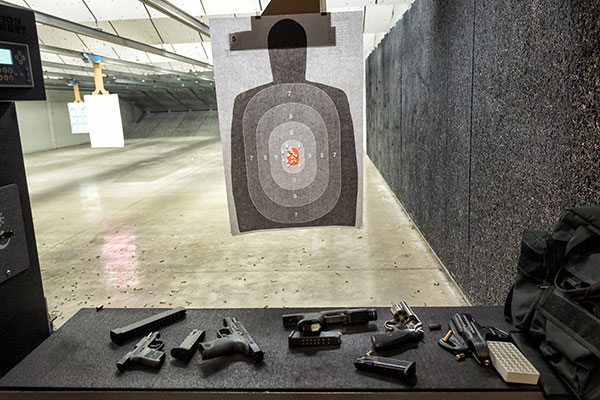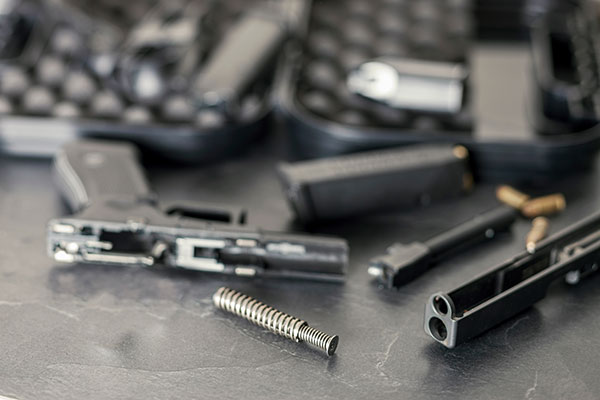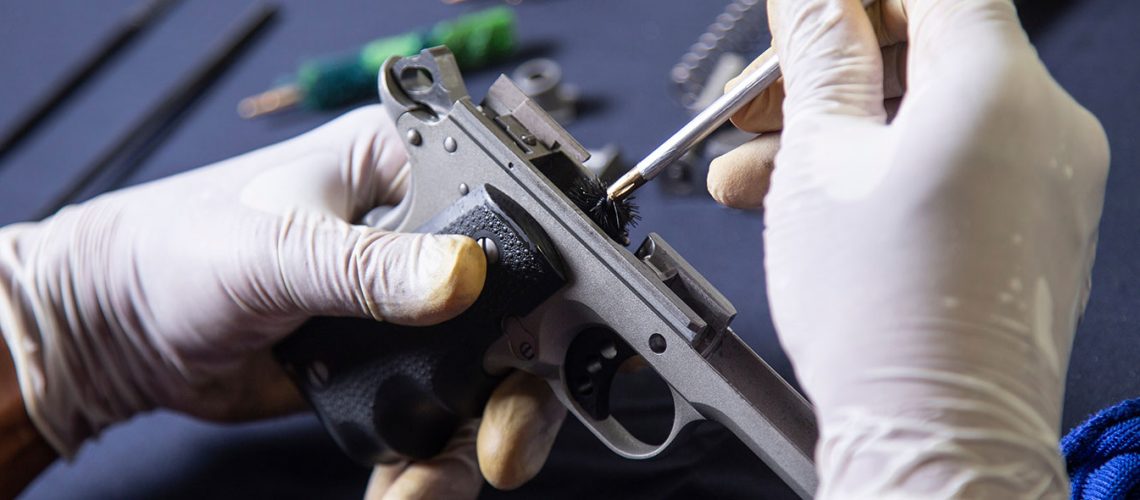The opinions regarding how often a firearm should be cleaned are as vast and varied.
Some insist that your gun should be cleaned every time you glance at it, and others observe a hard count of rounds fired.
 The U.S. Army cleans all its firearms—pistol, rifle, machine gun, etc. —every 90 days whether they’ve been fired or not. In wet or humid conditions, even more frequently.
The U.S. Army cleans all its firearms—pistol, rifle, machine gun, etc. —every 90 days whether they’ve been fired or not. In wet or humid conditions, even more frequently.
In between, there are some general guidelines that you’ll find helpful in determining when you should clean your firearm.
Naturally, the type of firearm and its use will help determine the cleaning frequency of that particular firearm.
THINGS TO THINK ABOUT
Every time you fire your gun, gunpowder, gases, and whatever oil or grime in the barrel continue to accumulate. That process, called “fouling”, coats your barrel with unwanted residue.
Over time, barrels can corrode or become damaged if a firearm has been continually used without cleaning, or has been allowed to sit for a long period of time with an unclean barrel.
Like almost anything—from hubcaps to a barbecue grill—it’s easier to clean more frequently than waiting for a troublesome excessive buildup. A quick clean after some target practice is a lot easier than some major effort on a barrel that’s seen 3000 rounds since cleaning.
 (For even more background info, here’s a link to our article on breaking in a barrel, which explores your barrel wear in further detail.)
(For even more background info, here’s a link to our article on breaking in a barrel, which explores your barrel wear in further detail.)
Certain ammunition is corrosive, and will leave potassium chloride or sodium chloride in your barrel. Those chemicals will certainly corrode your barrel, regardless of how inexpensive the rounds are. (Inexpensive in good part because they are corrosive.)
Moisture, whether it comes from rain, steam, humidity in the air, or sweaty hands, will rust your firearm. And, rust is a killer when it comes to firearms. Whenever and wherever it happens.
Does cleaning require some time and effort? Of course, it does. But not nearly so much as putting it off.
 FREQUENTLY USED FIREARMS/AT THE RANGE
FREQUENTLY USED FIREARMS/AT THE RANGE
Any gun you take to the range is obviously going to be firing a good number of rounds. For that reason, your firearm should probably be cleaned after an average session at the range. Some would say that it should be cleaned each and every time you use it at the range. 200 rounds or more probably means you should clean your gun after the range.
 HUNTING
HUNTING
You might not fire as many shots as you would on a day at the range when on a hunt, but hunting rifles and shotguns can be exposed to dirt—waiting in the bushes or a deer blind to take that perfect shot. And, they can also be exposed to morning moisture common with the early start to a hunt. Hunting firearms should be cleaned after every hunt.
EVERY DAY CARRY
Even though your carry gun probably won’t be exposed to especially harsh conditions, and hopefully won’t be fired very often (except at the range), the purpose for it demands flawless functioning. After all, it could be a matter of life and death. So, you’ll want to clean and inspect your every day carry after each visit to the range.
GUNS IN STORAGE
Even stored guns should be cleaned once or twice a year. A little residue, dust, or moisture can still cause damage to your gun over time, even in a proper gun safe.
CONSIDER THE COATING
How your barrel is coated will also help determine the cleaning schedule. It’s an inescapable fact that a blued barrel will require more cleaning than a stainless one. In fact, there are coatings like cerakote, melanite, tennifer and others that are specifically designed to resist corrosion.
And, those special coatings will help resist corrosion a bit longer, but they will still need to be cleaned when necessary. Another reason to consistently inspect your firearm, even with a coating more resistant to corrosion, residue, or buildup.
SPECIAL CIRCUMSTANCES
At the end of the day, there are certain types of firearms that are just going to need more extensive and perhaps even more tedious cleaning.
If you fire a black powder firearm, you likely already know this. Black powder creates a lot more residue and will therefore need more regular, and more in-depth cleaning.
Any firearm that’s consistently exposed to moisture—be it water, rain, or moisture of any other kind—it’ll need more, and more frequent, cleaning. So, if you’re hunting or carrying near water, snow, or excessive humidity, get ready to clean.
And, as mentioned earlier, if your firearm uses old, corrosive ammo? You’d best be cleaning after every use. Or, your barrel will without question corrode.
 IS THERE SUCH A THING AS OVERCLEANING?
IS THERE SUCH A THING AS OVERCLEANING?
There are parts on a firearm that can be damaged by overzealous or incorrect cleaning. But that is usually an error of tools or technique, or both. In general, proper cleaning of a firearm can’t hurt or damage it. So, if you ask yourself the question, “Should I clean my gun?” the answer “yes” is hardly, if ever, wrong.
A firearm is a machine, and like any other, has to be properly cleaned and maintained to operate at peak performance. Being aware of how many rounds have been fired since the last cleaning, inspecting your firearm, and paying attention to performance will all inform your decision of how often, and when, to clean your firearm.

